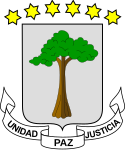
The politics of Equatorial Guinea take place in a framework of a presidential republic, whereby the President is both the head of state and head of government. Executive power is exercised by the government. Legislative power is vested in both the government and the Chamber of People's Representatives

Teodoro Obiang Nguema Mbasogo is an Equatoguinean politician, and former military officer who has served as the second president of Equatorial Guinea since August 1979. He is the longest-serving president of any country ever and the second-longest consecutively-serving current non-royal national leader in the world.

The Democratic Party of Equatorial Guinea is the ruling political party in Equatorial Guinea. It was established by President Teodoro Obiang Nguema Mbasogo on 11 October 1987.

Convergence for Social Democracy is the opposition party in Equatorial Guinea. It was the only opposition party with parliamentary representation during 2013-2017.

Equatorial Guinea elects on the national level a head of state – the president – and a legislature. The president is elected for a seven-year term by the people. President Teodoro Obiang Nguema Mbasogo was re-elected unopposed on 15 December 2002. The Chamber of People's Representatives has 100 members, elected for a five-year term by proportional representation in multi-member constituencies.

Presidential elections were held in Equatorial Guinea on 15 December 2002. Incumbent President Teodoro Obiang Nguema Mbasogo easily won another term amidst an opposition boycott.
Obiang is a surname. Notable people with the surname include:

A constitutional referendum was held in Equatorial Guinea on 15 August 1982 following the overthrow and execution of Francisco Macías Nguema in the 1979 coup d'état. The new constitution replaced the 1973 document and appointed Teodoro Obiang Nguema Mbasogo president for seven years, as well as making provisions for the protection of human rights and limited political representation. It was passed by 95.8% of voters with a 93.5% turnout.

Legislative elections were held in Equatorial Guinea on 26 May 2013, alongside local elections. Following constitutional reforms approved in a 2011 referendum, they were the first elections in which the newly established Senate is elected. The ruling Democratic Party of Equatorial Guinea won all but one seat in both houses of Parliament.

Equatorial Guinea–North Korea relations refers to the current and historical relationship between Equatorial Guinea and North Korea. While Equatorial Guinea has no representation in North Korea, it is one of few African states to have a North Korean embassy, located in the capital of Malabo.

Presidential elections were held in Equatorial Guinea on 24 April 2016. In a vote initially scheduled for November but brought forward by seven months, incumbent President Teodoro Obiang Nguema Mbasogo retained his office with 93.7 percent of the vote.

Equatorial Guinea–Spain relations refers to the diplomatic relations between Equatorial Guinea and Spain. Both nations are members of the Association of Academies of the Spanish Language, Organization of Ibero-American States and the United Nations.
The Supreme Military Council — initially called the Military Revolutionary Council — was the ruling military junta and the de facto government of Equatorial Guinea between the 1979 coup d'état and the 1982 constitutional referendum.

General elections were held in Equatorial Guinea on 20 November 2022 to elect the President and members of Parliament, alongside local elections. Originally the parliamentary elections had been scheduled for November 2022 and presidential elections for 2023. However, in September 2022 Parliament approved a proposal to merge the elections due to economic constraints.
Capital punishment is no longer a legal punishment in Equatorial Guinea.
Events in the year 2022 in Equatorial Guinea.

The 1982 Constitution of Equatorial Guinea was the country's third constitution. Following the 1979 military coup that removed Francisco Macías Nguema from the presidency, a popular referendum obtained 95.8% of votes in favor of the new Constitution in August 1982. The Constitution, which the United Nations helped draft, added provisions for human rights, outlined a new free-market economy for the country, and nominally restored national elections.
Events in the year 2023 in Equatorial Guinea.
Salvador Ondo Nkumu is an Equatoguinean politician and former judge who has served as the country's Minister of Justice since 2018. He had previously served as Minister of Justice from 2008 to 2011.








